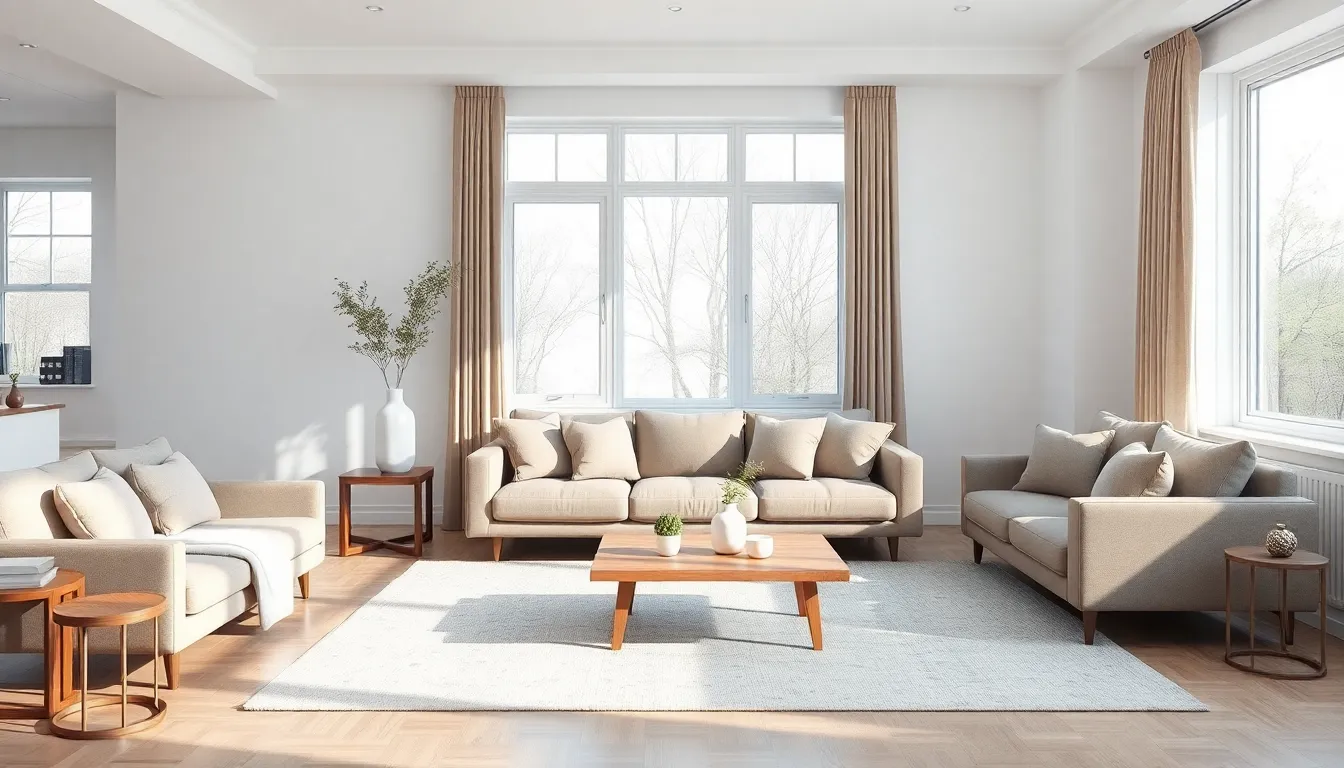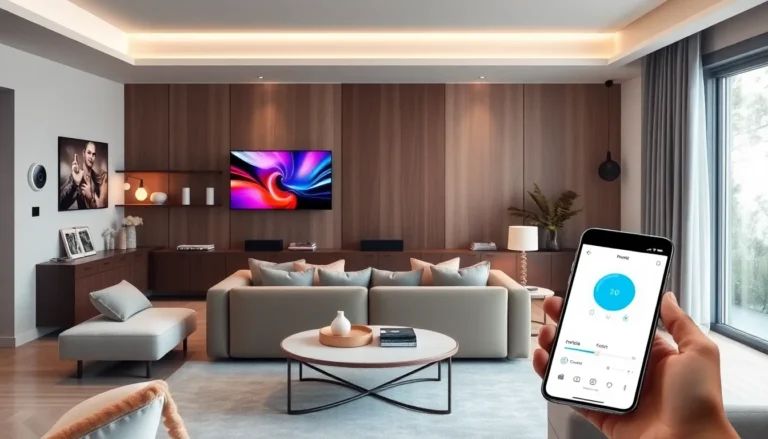Table of Contents
ToggleIn a world where clutter seems to multiply faster than rabbits, achieving a clutter-free living space can feel like an impossible quest. Yet, it’s not just about tidying up; it’s about reclaiming your sanity and finding joy in your surroundings. Imagine walking into a room that feels like a breath of fresh air instead of a chaotic tornado zone.
Clutter-free living isn’t just a trend; it’s a lifestyle that promises peace, productivity, and maybe even a few extra hours in the day. With some humor and a dash of determination, anyone can transform their home from a hoarder’s paradise into a serene sanctuary. So grab that trash bag and get ready to unleash your inner minimalist—your future self will thank you (and probably throw a small party in your newfound space).
Understanding Clutter-Free Living
Clutter-free living encompasses a lifestyle choice that prioritizes simplicity and organization. This approach fosters clearer living spaces and contributes to mental well-being.
Definition and Concept
Clutter-free living means creating an environment that minimizes unnecessary items. This concept promotes keeping meaningful possessions while discarding those that no longer serve a purpose. A decluttered home reflects one’s values and ideals. Maintaining such a space offers opportunities for mindfulness, promoting a sense of clarity that enhances everyday life. This idea goes beyond physical spaces, emphasizing the importance of mental decluttering too.
Benefits of a Clutter-Free Lifestyle
A clutter-free lifestyle brings multiple benefits that affect both mental and physical well-being. Reducing clutter often leads to improved focus and higher productivity levels. Enhanced serenity in one’s home encourages relaxation and reduces stress. Simplified spaces save time spent on cleaning and organizing, allowing for more leisure activities. Better room layouts can improve functionality and adaptability too. Adopting this lifestyle encourages individuals to appreciate their surroundings and enjoy a sense of accomplishment.
Steps to Achieve Clutter-Free Living

Achieving a clutter-free living space involves targeted actions that transform one’s environment. Focus on practical steps that lead to a streamlined lifestyle.
Decluttering Your Space
Start by assessing each room methodically. Identify items that lack functionality or emotional significance. Categories can include clothing, kitchenware, and décor. For instance, donating unused clothing benefits others and frees up space in closets. Establish a routine for decluttering, such as dedicating 15 minutes daily. This small time investment creates significant changes over weeks. Utilize the four-box method—keep, donate, sell, and discard—to simplify decision-making. Avoid holding onto items purely for sentimental value, as they contribute to clutter rather than joy.
Organizing and Simplifying
Organizing begins after decluttering, focusing on functionality. Use storage solutions like bins, baskets, and shelving that enhance accessibility. Labeling containers aids in locating items quickly. For easier maintenance, implement a one-in, one-out rule; for each new item, remove an old one. Make digital decluttering a priority, too; unsubscribe from emails and organize computer files regularly. Creating designated spaces for essentials minimizes chaos, ensuring everything has a home. Simplifying routines, like meal prepping, can also reduce household clutter and save time. Prioritize what matters, allowing for clarity and peace in daily life.
Maintaining a Clutter-Free Home
Maintaining a clutter-free home requires consistent effort and intentional habits. Embracing daily routines helps sustain a serene living environment.
Daily Habits for Sustainability
Incorporating simple daily habits makes a significant impact on clutter prevention. Setting a designated space for each item ensures organized surroundings. Spending a few minutes each day to tidy surfaces prevents the build-up of unnecessary items. Regularly evaluating belongings allows individuals to identify what truly matters. Committing to the one-in, one-out policy supports a balanced inventory of possessions. This proactive approach not only reduces clutter but also enhances mental clarity. Establishing a “clear the clutter” time each week creates a routine that reinforces organization.
Seasonal Decluttering
Seasonal decluttering serves as an effective strategy for deeper organization. Choosing a specific time each season provides a clear timeframe for assessing belongings. Evaluating items based on functionality and relevance helps prioritize what to keep. Gathering unwanted items for donation or disposal maintains the momentum of decluttering. Transitioning seasonal items, like clothing and decorations, keeps spaces fresh and dynamic. Committing to a thorough clean-out during these designated times cultivates a mindful approach to possessions. Seasonal decluttering contributes to ongoing maintenance, keeping living spaces serene and inviting.
The Emotional Impact of Clutter-Free Living
Clutter-free living significantly enhances emotional well-being. By creating a tidy environment, individuals experience improved mental clarity and focus, along with reduced stress levels.
Mental Clarity and Focus
Improved mental clarity and focus often stem from a decluttered space. Simplifying one’s surroundings minimizes distractions and enhances concentration. When items are organized, individuals find it easier to locate essentials, leading to more efficient routines. Increased mental space promotes creative thinking and problem-solving abilities. Consequently, a serene environment fosters a productive mindset, allowing thoughts to flow freely.
Stress Reduction
Reduced stress is a notable benefit of clutter-free living. A well-organized space creates a sense of peace and control. Uncluttered environments eliminate anxiety triggers, enabling individuals to unwind more easily. By minimizing visual chaos, stressors associated with overwhelming choices disappear. Furthermore, regular decluttering practices instill a proactive mindset, allowing individuals to manage their environment actively. In such settings, emotional resilience flourishes, paving the way for better mental health.
Embracing clutter-free living can transform not just physical spaces but also mental landscapes. By prioritizing simplicity and organization individuals can create environments that foster peace and productivity. The journey toward a decluttered life is ongoing and requires consistent effort but the rewards are profound.
In a world filled with distractions a tidy space promotes clarity and focus. It allows individuals to reconnect with what truly matters while minimizing stress and anxiety. By adopting mindful habits and regular decluttering practices anyone can cultivate a serene and inviting home that enhances overall well-being. Ultimately clutter-free living is more than a trend; it’s a lifestyle choice that leads to a more fulfilling life.







